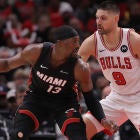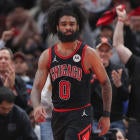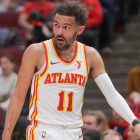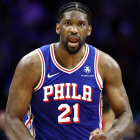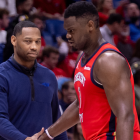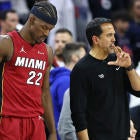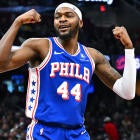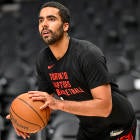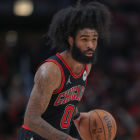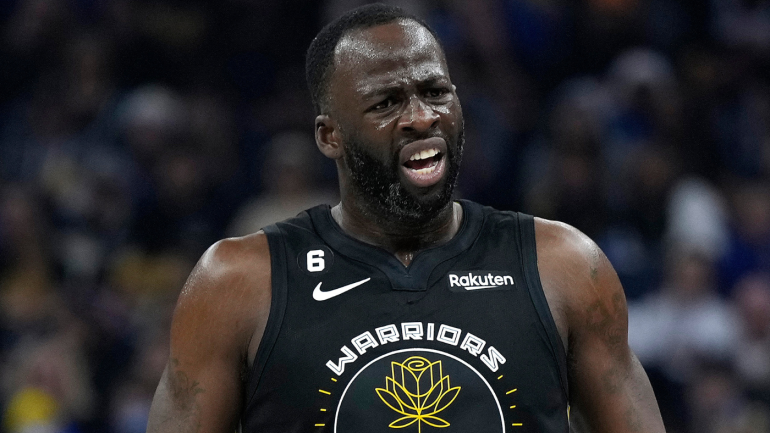
You've likely heard it repeated that this NBA season has no obvious frontrunner, but the parity runs quite a bit deeper. We could, in fact, argue that this season contains more parity than any other in NBA history. Here are some relevant numbers:
- The Boston Celtics lead the NBA with a net rating of plus-6.1. If that holds, this would be the first season this century in which no team managed to crack plus-7. A typical champion is pushing double figures.
- The defending Western Conference champion is below .500. The three preseason Western Conference favorites have a combined record of 72-72.
- Two games separate the No. 2 and No. 5 seeds in the Eastern Conference. One of those teams gets to host a play-in team in the first round. The other won't even have home-court advantage.
- The No. 6 and No. 13 seeds in the Western Conference are separated by one loss.
There will be no complaints of a predictable NBA this season. There's no obvious answer for who will win the championship, and as such, more teams than ever are going to convince themselves between now and Feb. 9 that they can be the team that wins the championship. As such, we should expect a relatively active trade deadline.

CBS Sports HQ Newsletter
Your Ultimate Guide to Every Day in Sports
We bring sports news that matters to your inbox, to help you stay informed and get a winning edge.
Thanks for signing up!
Keep an eye on your inbox.
Sorry!
There was an error processing your subscription.
But who is going where? We've covered the key sellers already, so now, let's talk about the buyers. With so many teams in the hunt, we'll limit things to the top six seeds in each conference as well as a few stragglers who have an increased urgency to win this season, and we'll cover what they need, where they might get it, and what it might cost.
Boston Celtics
- What they need? A shooting forward. Boston signed Danilo Gallinari in the offseason for this exact purpose, but a torn ACL knocked him out for the season. Sam Hauser filled the role beautifully early in the season, but he's barely shot above 30 percent from deep since the beginning of December. Boston's offense got awfully cramped when Jayson Tatum or Jaylen Brown sat last postseason, so filling this role, either with a rejuvenated Hauser or someone else, is imperative.
- Assets to offer? Boston only owes a single first-round pick, the one it sent to Indiana for Malcolm Brogdon, so Boston can move its other selections pretty freely. Matching salary is the bigger concern, as Boston's six highest-paid players all play critical roles in the rotation. Still, Boston can offer Gallinari's $6.5 million along with a smaller deal to nab someone making roughly mid-level money.
- Best targets? Doug McDermott would be perfect, but he's sadly just out of Boston's salary range. Keep an eye on P.J. Washington. He's set for restricted free agency this offseason, and with the Hornets tanking, he'll be available if Charlotte doesn't plan to re-sign him.
Philadelphia 76ers
- What they need? A reliable backup center. P.J. Tucker will take this role in certain postseason matchups, but certain opponents (notably, Milwaukee) necessitate a more traditional option, and with seeding paramount in the competitive Eastern Conference, Philly needs to find a way to win the minutes Joel Embiid sits. As it stands, their net rating drops by more than 10 points per 100 possessions whenever he goes to the bench. This is especially important given Doc Rivers' history in the postseason. His misguided commitment to DeAndre Jordan cost Philly a chance to steal a game in Miami last postseason, and his refusal to bench Montrezl Harrell led to a 3-1 collapse for the Clippers in the bubble. If Daryl Morey gives him the chance, Rivers will use the wrong center.
- Assets to offer? Philly can't trade a single first-round pick thanks to several older deals, and because of the hard cap, they are severely limited in terms of absorbing salary. Fortunately, with Furkan Korkmaz and Danuel House proving inessential this season, the Sixers can aggregate them in bring in a backup making roughly $9 million. As far as value goes, they are essentially limited to players on the roster (Matisse Thybulle?) and second-round picks.
- Best targets? The first call Philly needs to make is to Chicago for Andre Drummond, who has seemingly fallen out of favor. Drummond makes only $3.2 million and played very well for the Sixers last season, so the fit is obvious. Nerlens Noel is another obvious candidate. His salary matches up with Korkmaz and House perfectly and he can hold his own defensively in practically any matchup. The cost there would likely only be second-rounders, so he's attainable. Boban Marjanovic might be worth a look if no better options are available if only because he at least has gimmick uses in the right matchups (though he's a disaster defensively against the wrong offenses).
Milwaukee Bucks
- What they need? It's hard to say. There have been major offensive issues, but Khris Middleton's return likely solves many of them. Another wing defender would be appreciated as well, as they never quite replaced Tucker when he left in free agency. Ultimately, they'd likely prioritize another ball-handler over a defender if they had a chance to land either, but ultimately the market will probably dictate their target. Any solid rotation player could help given Milwaukee's unusual lineup flexibility.
- Assets to offer? If the Bucks are willing to put their unprotected 2029 first-round pick in the table they'll be able to add someone of significance. If not? They're working with second-rounders and operating on the fringes. The Bucks are over the tax and having limited matching salary, but Grayson Allen ($8.5 million) has become somewhat redundant now that Joe Ingles is back, and George Hill ($4 million) probably can't play in the playoffs, so flipping those two for someone in the $15 million range is the best course.
- Best targets? The two names to watch here are Jae Crowder, who they've been linked to all season, and Bogdan Bogdanovic, who they nearly landed in 2020. Bogdanovic would become the best bench ball-handler they've had during the Giannis Antetokounmpo era, but Atlanta has played well since Clint Capela returned and may not want to sell. The Suns would seem to prefer win-now talent in a Crowder deal, but perhaps Milwaukee could create a three-team deal with someone that wants Allen's shooting.
Brooklyn Nets
- What they need? A shooting big man would be very much appreciated. Nic Claxton is having the best season of his career, but spacing in the playoffs will become an issue with him and Ben Simmons, and even if it doesn't, there are going to be moments when it becomes untenable to have two sub-50 percent free-throw shooters on the floor. Their wings tend to lean a bit more heavily toward "3" than "D" as well, so if the right wing hits the market, they'll go for it. Shot-creation isn't a need when healthy, but it would probably behoove them to trade for another scorer if the right one is available just because of the injuries Kevin Durant and Kyrie Irving deal with every year. The Nets can't win the title without them, but the right trade could insulate them against a random sprained ankle in the second round.
- Assets to offer? Brooklyn actually has plenty to work with. The Nets can trade their own 2029 first-rounder as well as the 2027 pick they got from Philadelphia in last year's James Harden trade. Cam Thomas probably has value to certain teams and Day'Ron Sharpe might as well. Patty Mills is their most obvious matching salary ($6.5 million), but in the right deal, they'd likely consider moving either Seth Curry ($8.5 million) or Joe Harris ($18.6 million) knowing that having one protects against the loss of the other.
- Best targets? They'll make the call to Indiana for Myles Turner, but for now, he's probably not moving. Nikola Vucevic is worth a call if Chicago decides it doesn't plan to re-sign him this offseason, but matching his $22 million salary would cost the Nets Harris, whom the Bulls may not be eager to absorb. The lower-end big man to watch here is Naz Reid, an offense-first backup in Minnesota who's due for free agency this offseason.
Cleveland Cavaliers
- What they need? Someone between 6-foot-6 and 6-foot-9 who can either defend forwards credibly or consistently make open 3-pointers. That's basically it. Their backcourt is set between Donovan Mitchell, Darius Garland and Ricky Rubio. Their front court is set with Evan Mobley, Jarrett Allen and Kevin Love. Even Dean Wade is a perfectly acceptable backup in that 3-and-D wing slot. They just need someone who can give them 25 competent minutes in the starting lineup.
- Assets to offer? Cleveland can't offer a single first-round pick because of the Mitchell deal, but in Caris LeVert, they have a veteran who would appeal to certain teams and in Isaac Okoro, they have a youngster who will appeal to other ones. Between the two, they have a decent chunk of the market covered. Throw in Cedi Osman's $7.5 million salary and they're pretty flexible in terms of salaries they can absorb.
- Best targets? Crowder is the obvious call here, and given Phoenix's health issues in the backcourt, LeVert might appeal to the Suns. Detroit would probably turn down any sort of Okoro-for-Bojan Bogdanovic offer, but that's worth exploring. So is P.J. Washington, as the cost-conscious Hornets might like the idea of kicking the rookie extension can down the road another year. McDermott is definitely attainable if they want to prioritize offense.
Miami Heat
- What they need? A star. This is true of most teams, but it's especially true of Miami, a team too good to go backward but simply not talented enough to win three series against the five teams above them. Add another star to the mix and that might change. It's that simple.
- Assets to offer? Anything but Jimmy Butler and Bam Adebayo would theoretically be on the table as it was for Donovan Mitchell and Kevin Durant in the offseason. The easiest star package to construct here would be Tyler Herro (though his extension creates complicated base-year compensation issues), either Kyle Lowry or Duncan Robinson as matching salary and three first-round picks (which they could only unlock if they get Oklahoma City to agree to make their 2025 pick unprotected).
- Best targets? The Wizards have already made their first move toward the bottom by gift-wrapping Rui Hachimura to the Lakers. The Heat are surely watching Bradley Beal with great interest. The same can probably be said of Damian Lillard as Portland continues to slide. Either of Toronto's forwards (OG Anunoby or Pascal Siakam) could go a long way considering how thin Miami's front court is, but for now, the Raptors appear likelier to move Fred VanVleet.
Denver Nuggets
- What they need? Defense. Nikola Jokic can make virtually anyone work offensively. The Nuggets currently have the most efficient offense in NBA history. They need people who can prevent the other team from scoring. Any position will do. An upgrade at backup center would be helpful as well, as Denver's net rating drops by a staggering 21.9 points per 100 possessions when Jokic sits.
- Assets to offer? Denver still has its 2029 first-round pick, but in order to trade it, they'd either need three teams (the Hornets, Magic and Thunder) to agree to remove protections on picks the Nuggets currently owe them or they'd need the accepting team to take the pick knowing it may never convey due to those protections. Without their first-rounder, they'd be limited to second-round picks and some of their promising younger players (Bones Hyland, Christian Braun and Zeke Nnaji). Matching salary is a challenge, but Ish Smith and Jeff Green get them to nearly $9 million.
- Best targets? The backup center question is complicated. Denver has, in the past, preferred having big men who could serve as offensive hubs like Mason Plumlee so that their bench wouldn't need to deviate too harshly in terms of playing style. Those guys are hard to find, though Plumlee himself is likely available on an expiring $9 million contract. If they want someone who differs a bit from Jokic, Noel makes plenty of sense as well especially since his defensive versatility makes him theoretically viable in lineups featuring the reigning MVP. Old friend Gary Harris is certainly available in Orlando, and now that he's found his shot again, he'd be a viable backup guard in the postseason.
Memphis Grizzlies
- What they need? Basically nothing. The Grizzlies are an elite defensive (ranked No. 1) and rebounding (No. 2) team without sacrificing offense (No. 11). They're not a great shooting team (22nd in 3-point percentage), so they could stand to add a sniper if they see one, but they aren't going to risk compromising their defense for short-term gains. Basically, if the Grizzlies make a major trade, it will be because they've seen a long-term fit available at a fair price.
- Assets to offer? The Grizzlies have all of their own first-round picks as well as a few from other teams. They can credibly trade for any non-star on the market. Danny Green's $10 million salary represents their most obvious matching salary.
- Best targets? The Grizzlies are the obvious OG Anunoby team, especially if they don't feel comfortable making an eight-figure commitment to Dillon Brooks this offseason. Gary Trent, Eric Gordon or either Bogdanovic would be good fits to fill that shooting hole, but they all make a bit too much money to be traded just for Green. Given Trent's age, he might be worth tossing in a youngster like David Roddy to make the money work. If Green is the only salary they want to move, then Gary Harris and Doug McDermott are the two easiest fits.
Sacramento Kings
- What they need? Perimeter defense. The Kings rank 23rd on that end of the floor, and while you could argue that a center might have a more pronounced impact on their defensive woes, moving Domantas Sabonis to power forward (as he played in Indiana) would have a devastating ripple effect on their offense. The goal here is to find a forward who can help the defense without getting in the way of what's working offensively.
- Assets to offer? The Kings only owe a single first-round pick to Atlanta from the Kevin Huerter trade, but the protections on that pick last until 2026. That bars them from trading any first-rounders until 2028. They could unlock an extra pick by removing those protections, but given their history, that's a dangerous gambit. An easier workaround would simply be to trade a pick with "next available" language, but that requires a trade partner comfortable with uncertainty. Davion Mitchell, who has seen his role reduced with Huerter and Malik Monk in place, would surely interest teams. If they want to shop in the higher end of the market, Keegan Murray would have a ton of value on the trade market.
- Best targets? The only player worth Murray that may be available is Anunoby. If that's a swap the Kings could make, it's worth serious consideration provided Anunoby is comfortable extending in Sacramento. He's only 25, so like Murray, he could be a long-term fixture for the Kings. Assuming that trade isn't on the table, a lightly protected future first-rounder for Kyle Kuzma makes some sense. Is Washington still open to a deal? Or did they move Rui Hachimura expecting to back up the Brinks truck for Kuzma? On the lower end of the spectrum, Jae Crowder is a pretty clean fit at a lower price point.
New Orleans Pelicans
- What they need? Not much. Like the Grizzlies, the Pelicans are playing well in almost every facet of the game. They're a low-volume 3-point shooting team, so another shooter would be helpful, but they're still so early in their contending cycle that they can afford to let this season play out, allow weaknesses to present themselves organically, and then adjust this offseason when they have a clearer idea of how this roster, when healthy, fares in the postseason. Right now, the Pelicans are so deep that it's hard to say that they "need" anything. Many of the players other teams will add at the deadline aren't even good enough to play meaningful minutes for the Pelicans.
- Assets to offer? Virtually limitless. They have their own picks. They have those very juicy Lakers picks. They have young players like Dyson Daniels. They have easy matching salary in Devonte' Graham and Garrett Temple. The Pelicans can trade for any player that becomes available, stars included.
- Best targets? Many of the same shooters Memphis should target apply to New Orleans, but with more matching salary to work with, players like Bojan Bogdanovic, Gary Trent and Eric Gordon feel more attainable. Gordon probably makes the most sense because he can be had at a minimal cost in terms of draft picks and with no long-term salary obligation (unless his team wins the championship, which guarantees his contract for next season, but something tells me New Orleans could live with that outcome). The Pelicans have the draft capital to go after Anunoby of VanVleet as well, but salary is the greater concern. Both would fit well, but New Orleans is already slated to pay the tax next season. Another hefty salary is probably not tenable.
Dallas Mavericks
- What they need? Another ball-handler. The Dallas offense gets roughly 12 points per 100 possessions worse whenever Luka Doncic sits, and even when he's on the floor, his usage rate of 38 percent is not sustainable. Doncic might be the best playoff player in the world through three quarters. He wears down late because Dallas hasn't given him enough help. He's reportedly asking them for help. There may not be a bigger single need across the league than this at the deadline.
- Assets to offer? Dallas currently owes the Knicks its 2023 first-rounder, but it is protected through 2025, so trading picks before 2027 is currently difficult. That Knicks pick is dictating a lot of Dallas' hesitance right now. If the Mavericks can just hold out until the offseason, that pick will convey and they can offer their entire package of first-round picks, four of them along with three swaps, for a superstar to be Doncic's long-term sidekick. If that is their plan, right now, they are limited to second-round picks. Fortunately, they have so much available matching salary that they can bring in almost anyone whose value is less than a first-round pick.
- Best targets? Charlotte, by virtue of its poor contracts, is probably a worthwhile starting point. If they could flip Tim Hardaway Jr. and second-round picks for Rozier just because Rozier has an extra year on his deal, that would be quite helpful. Perhaps there's a bigger deal involving Gordon Hayward, but good players attached to bad contracts is where Dallas will find value without giving up a first-round pick. Bogdan Bogdanovic is another possible idea given his injury issues.
Los Angeles Clippers
- What they need? Someone who can pressure the rim. The Clippers have as much shooting as any team in basketball, but when either of their stars aren't on the floor, they struggle to generate advantages and create good looks for those shooters. The Clippers rank 25th in restricted area shots per game and 27th in restricted area field goal percentage. Someone has to be able to get to the basket for this offense to work.
- Assets to offer? The Clippers can offer their unprotected 2028 or 2029 first-round pick, but the rest of their draft capital is tied to the Thunder as part of the Paul George trade. They have as much matching salary as is necessary, and aside from George and Kawhi Leonard, virtually anyone should be on the table.
- Best targets? This is going to sound a tad crazy... but what about Markelle Fultz? The Magic don't need to trade him, but would probably prefer their guards to be shooters for the long haul given all of the ball-handling they have in the front court. Regardless of his shooting woes, he offers the exact traits the Clippers need. A more conventional approach might be someone like Terry Rozier, who is early into a contract extension the rebuilding Hornets probably regret. He's not as strong a finisher as Fultz, but he's a better shooter and still explosive. He's small, but the Clippers have more than enough wing size to cover for him.
Phoenix Suns
- What they need? In the short term, they, like the Clippers, need to better pressure the rim. The Suns are extremely reliant on jump-shooting. The difference is that the Suns can afford to take a slightly longer view here than the Clippers because Devin Booker, Mikal Bridges and DeAndre Ayton are so young. Chris Paul isn't, so the priority will likely be finding a point guard who can eventually replace Paul in Phoenix's core.
- Assets to offer? The Suns have all of their first-round picks, and between Dario Saric and Jae Crowder, they have plenty of matching salary as well. Practically anyone available is in play here.
- Best targets? Phoenix is the logical Fred VanVleet fit, though he provides almost no rim pressure. He's one of the few guards on the market that could credibly fill in for Paul while playing with him in the short-term. He can defend well above his meager height, so three-guard lineups featuring Paul, Booker and VanVleet could survive defensively and destroy defenses on the other end through shooting, ball movement and basketball IQ.
Golden State Warriors
- What they need? The Warriors never really replaced Otto Porter or Gary Payton II, though Donte DiVincenzo has taken the latter's minutes and provided value in different ways. A defensive guard and an all-purpose forward as insurance for Jonathan Kuminga (who is thriving, but is still too young and raw for significant playoff minutes) would be helpful. They've been linked to a few centers as well, but in the playoffs, there just aren't enough minutes to facilitate someone like Jakob Poeltl because Draymond Green will play the majority of his minutes there.
- Assets to offer? Is James Wiseman available? That's the major question. Not only is he one of Golden State's primary assets, but he's their biggest matching salary at $9.6 million. The answer here is probably no. In such an open Western Conference, the defending champions probably feel as though they don't need to risk their future for a win-now move. Therefore, virtually any major trade is unlikely.
- Best targets? If Wiseman is on the table, a swap for P.J. Washington makes sense for both sides. He could fill in for Porter, and if Draymond Green does leave in free agency this offseason, he gives Golden State a young forward to develop into some of those minutes. The Hornets just drafted Mark Williams, and he has flashed upside as a rookie, but Wiseman's athleticism is too rare to pass up for someone they might not re-sign anyway.
Los Angeles Lakers
- What they need? Shooting and defense. The Rui Hachimura trade at least gives them competent NBA minutes at forward, which they've lacked all season, but no team makes fewer 3-pointers than the Lakers, and their defense has ranked 22nd since Anthony Davis went down. They badly need 3-and-D players on either end of that spectrum, and if those players happen to be forward-sized? Then all the better.
- Assets to offer? Their 2027 and 2029 first-round picks. Put both of those on the table and they can add a real difference-maker or two. Get stingy and things get significantly harder, especially now that their second-round picks have been spent on Hachimura. Patrick Beverley is their easiest matching salary, but the truth is that they probably can't trade their way into championship contention with $13 million. Russell Westbrook, at $47 million with a skill set that does not make sense in the postseason, remains their best bet financially.
- Best targets? OG Anunoby is the lone player on the market who is worth both picks unprotected. Myles Turner and Buddy Hield are as a tandem, but for now, that trade still seems dead. You could argue that the combination of Fred VanVleet and Gary Trent warrants both picks, and on another team that argument would be stronger, but the Lakers are already so guard-heavy that they'd be committing to entering the postseason with one of the league's smaller rosters. For one pick, Bojan Bogdanovic and Kyle Kuzma are the forwards to watch.














